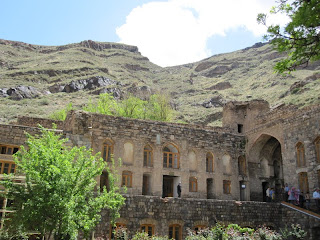Shah Abbas of the Safavid Dynasty forcibly moved 10,000 Armenian families from the area around Jolfa to Esfahan in the 17th century in order to assist him in rebuilding his new capital. They settled across the river in a part of the city which they named New Jolfa. The Armenians were known as being particularly fine craftsmen and, to this day, Reza told us, you want your car mechanic to be Armenian.
Armenian Church of St. Stephanos, outside Jolfa
We traveled by bus from Tabriz to Jolfa, close to the border of the Republic of Azerbaijan, to see this magnificent church and monastery. There is speculation about the earliest construction on this site (founded by St. Bartholomew in 62 AD or by an Armenian king in the 9th century) but the oldest part of the current structure is from the 14th century and most was constructed in the 16th. The setting is spectacular.
The carvings on the outside of the church, including a bas-relief of St. Stephanos being stoned to death, are very well preserved.

The dome is encircled by angels. Look at the similarity of the painted angel below and the carved angel above.
This soot-coated room and dome may have been a Zoroastrian Fire Temple, but it also might have been the kitchen for the site.
The monastery is still under reconstruction but the garden in front of it is beautiful.
Armenian Vank or All Saviors’ Cathedral, Esfahan
The church was begun in 1606 but was largely rebuilt in 1650-53, following the arrival of the Armenian families from Jolfa. The bell tower was built in 1764. The sanctuary, where photography is not allowed, is lined with one gruesome painting of torture and bloodshed after another. I found the paintings oppressive and left to visit the museum.
The most memorable part of my experience at the cathedral was my conversation with a group of young teenage school girls in the adjacent museum. They surrounded me and started with:
Can we ask you a few questions? Yes.
And continued:
Where are you from? America.
How do you like Iran? It is very beautiful.
Oh thank you. How do you like wearing the scarf? It is the law in your country. I want to visit your country so I must obey the law.
I decided to ask them some in return:
Do you have cell phones? Yes.
Do you talk to your friends on them? Yes.
What do you talk about? Our studies.
Do you ever talk about boys? Giggle giggle giggle. Oh no. We only talk about our studies.
















No comments:
Post a Comment